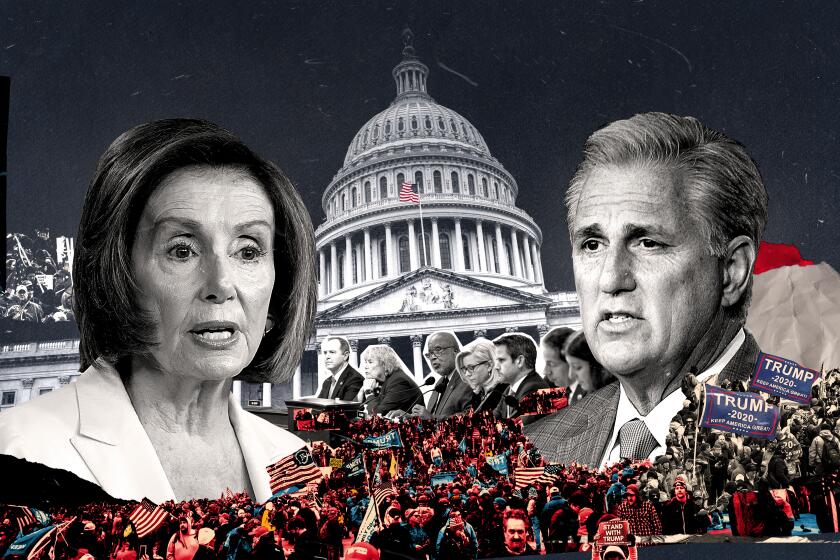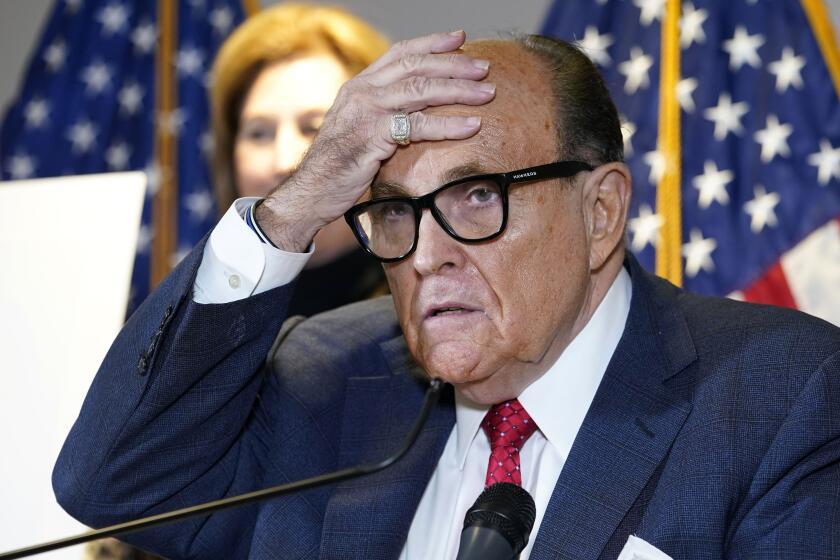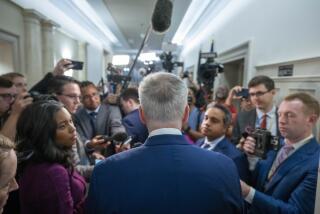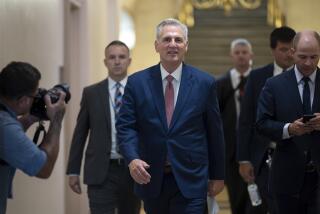Will Jan. 6 committee subpoena McCarthy? Congress could set up a political and legal showdown
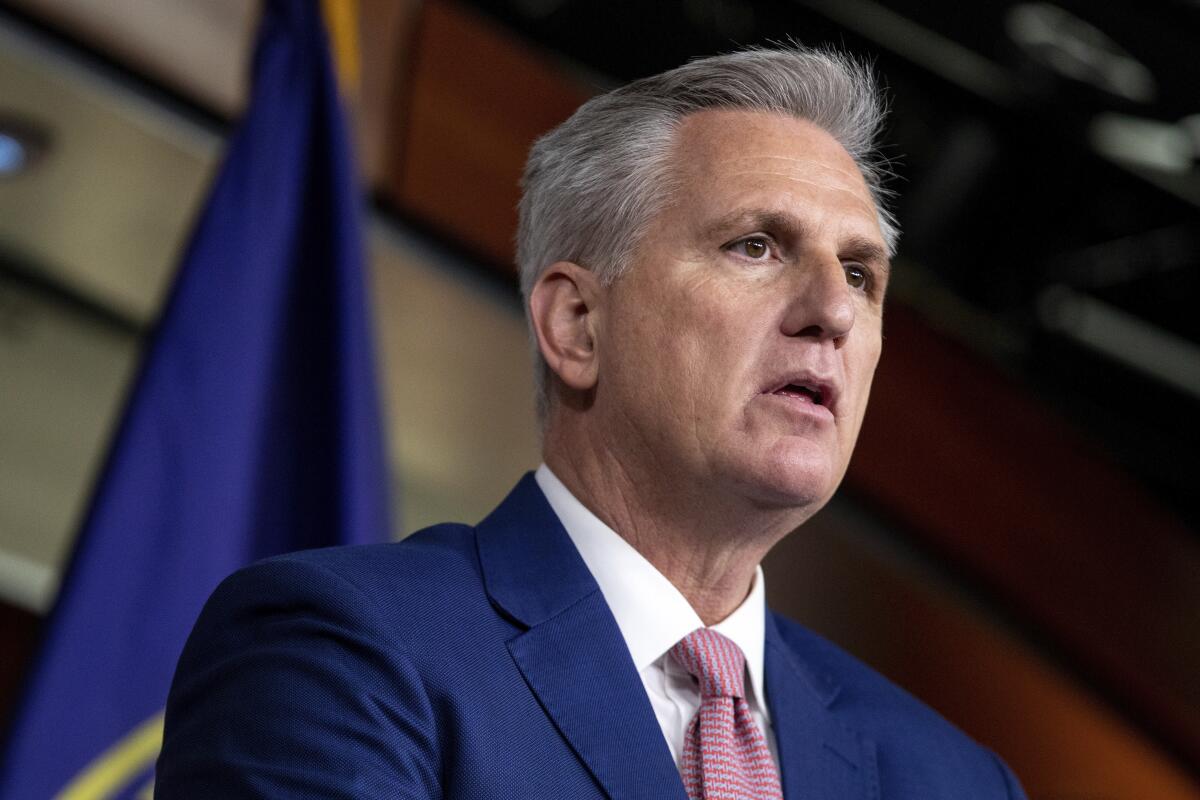
- Share via
WASHINGTON — House Minority Leader Kevin McCarthy’s refusal to cooperate with the congressional committee investigating last year’s Capitol assault marks his most definitive rejection of the Jan. 6 probe — thrusting him and the committee into uncharted legal and political waters.
His rebuke of the panel pushes its members closer to the difficult decision of whether to subpoena their House colleagues, a move that could advance their investigation, but also opens them up to accusations of extreme partisanship ahead of the midterms, and sets a precedent for future House probes.
The committee is requesting information from McCarthy on his communications with former President Trump before, during and after the attack on the Capitol. In a letter, committee Chairman Bennie Thompson (D-Miss.) pointed to McCarthy’s phone call with Trump while the attack was happening, in which the congressman asked Trump to help disperse the mob, as well as McCarthy’s meeting three weeks later with Trump at Mar-a-Lago.
Immediately after the Jan. 6 attack, House Speaker Nancy Pelosi and Minority Leader Kevin McCarthy seemed united. But the two have grown increasingly apart over how to move forward from the insurrection.
“The Select Committee has tremendous respect for the prerogatives of Congress and the privacy of its Members,” Thompson wrote in the Jan. 12 letter. “At the same time, we have a solemn responsibility to investigate fully the facts and circumstances of these events.”
Members of the Select Committee to investigate Jan. 6 have said they are open to using subpoenas to compel reluctant members of Congress to testify if they have the authority. But subpoenaing sitting members of Congress could have drawbacks in future sessions of Congress.
Republicans have already suggested they would launch a series of investigations into the Biden administration’s withdrawal from Afghanistan, the president’s son Hunter Biden and security failures that lead to the Jan. 6 attack, with a focus on scrutinizing House Speaker Nancy Pelosi. While those probes may happen regardless of the committee’s decision, its members must still weigh the importance of the testimony they seek against the precedent it might set for how the probes are conducted in a GOP-controlled House.
“This is one of those where, if you sow the wind, you reap the whirlwind,” said Jim Brulte, a former GOP leader of the California state Senate who served while McCarthy lead the lower chamber’s Republicans.
“Using the power of federal authority to compel your political rivals to participate in your political theater is horribly counterproductive,” he said. “And my guess is those who support it will regret it when people like [Ohio] Congressman Jim Jordan get the gavel and then decide to use that same authority on them.”
For McCarthy, there’s little political incentive to appear before the committee. While refusing to testify may give the impression that he has something to hide, he has criticized the committee as partisan and too limited in scope from the start.
“Any American voter, regardless of your perspective, or persuasion politically, that’s paying attention to this already fully expects that Kevin McCarthy is not going to appear before that committee, even if they subpoena him,” said Rob Stutzman, a Republican strategist based in California. “In some regards, I think this is all now going through the motions of the political theater that everyone expects to play out.”
McCarthy initially supported the formation of a bipartisan independent commission, but later withdrew his support. He also opposed the House select committee and withdrew all of his Republican nominees after Pelosi rejected two of his picks who were close Trump allies, Jordan and Rep. Jim Banks of Indiana.
The House committee investigating the Capitol insurrection has issued subpoenas to some of Donald Trump’s closest advisers, including Rudy Giuliani.
During a news conference last week, McCarthy insisted he’s already shared publicly everything he has to say. “There is nothing that I can provide the January 6 committee for legislation,” he said. “There is nothing in that realm, it is pure politics.” McCarthy’s office did not return a request for comment.
Issuing a subpoena is the most aggressive tactic the committee has to pressure reluctant witnesses to testify. “It’s the nuclear option,” said Kimberly Wehle, a law professor at the University of Baltimore School of Law.
Refusing to comply with a congressional subpoena could lead to a jail sentence, though it’s unlikely it will come to that in McCarthy’s case. First, the committee would need to issue a subpoena. If McCarthy didn’t comply, the committee and then the full House would vote to hold McCarthy in contempt of Congress. The criminal contempt report would then be referred to the Department of Justice, which in turn would decide whether to prosecute the case.
McCarthy could challenge the subpoena. He’s already argued that the committee has no “legitimate legislative purpose,” though the committee has made clear it is on a fact-finding mission and intends to recommend legislative changes to prevent a future attack.
He might also argue that his conversations with the former president are protected under the Constitution’s speech and debate clause, which protects members of Congress from outside lawsuits over legislative speech. But he would then need to prove that his conversations had a legislative purpose.
Assuming the committee pursues McCarthy’s testimony as aggressively as possible, their biggest handicap would be time. The House voted to hold former Trump aide Stephen Bannon in contempt of Congress on Oct. 21, and the Department of Justice indicted him on Nov. 12. His trial isn’t set to begin until July 2022.
Under a similar timeline, any legal case against McCarthy would extend past the midterm elections and into the next session of Congress, when Republicans have a strong chance of being in control of the House. “His number one defense is going to be delay,” said Wehle.
Democrats argue that refusing to meet with the committee implies McCarthy has something to hide, either to protect Trump or himself, given his shift in tone in the days after the Jan. 6 attack. Despite initially saying Trump bore “some responsibility” for the day’s events, McCarthy later softened his tone and said Trump didn’t provoke the siege of the Capitol.
“Kevin McCarthy has decided that his number one goal is to keep Trump and the most extreme elements of his party happy,” said Jesse Ferguson, a Democratic strategist and former Democratic Congressional Campaign Committee official. “He has no interest in winning the country.”
To win the country — and control of Congress — in the fall’s midterm elections, both parties will try to convince voters that they’re primarily concerned with kitchen table issues such asinflation and the economy. As Democrats’ agenda has been stalled by Senate Republicans, McCarthy and other leaders have tried to paint Democrats as singularly focused on the Jan. 6 committee. If Republicans control the House next year and undertake retaliatory partisan investigations, Democrats argue it would backfire on them with voters looking for a policy-focused agenda.
Karen Finney, Democratic strategist and senior advisor to Hillary Clinton’s 2016 presidential campaign said it would be reminiscent of the House Select Committee to investigate the 2012 attack on the U.S. Mission in Benghazi and Hillary Clinton’s role. A majority of Americans said at the time that they thought the investigation was politically motivated. But the probe did weaken Clinton, serving as the genesis of the more damaging probe into her use of a private email server.
“It would be more about a communications vehicle and a political vehicle than an actual attempt to get to the truth,” she said.
Recently polling suggests that the committee’s work is popular among voters, though the number dropped significantly among independents and Republicans when they felt it was more partisan. Sixty-one percent of voters surveyed in a Politico/Morning Consult poll released earlier this month said they support the Jan. 6 committee’s work, including 82% of Democrats, 58% of independents and 40% of Republicans.
But when those surveyed were told that House Speaker Nancy Pelosi appointed all of the committee’s members, those numbers dropped to 76% of Democrats, 43% of Independents and 16% of Republicans.
The Jan. 6 committee also risks being further politicized. Stutzman said Pelosi may have “overplayed her partisan hand” by removing McCarthy’s picks to the committee. Referring criminal charges against McCarthy to the Department of Justice might be a step too far for some voters, particularly independents.
“You’re getting into the idea of the recriminations of prosecution against political enemies,” said Stutzman.
But the path ahead is more straightforward for the committee:
It’s not certain what the committee will do next, but the expectations are clear: those who support its work expect the panel to push ahead, regardless of any potential backlash from voters or the threat of investigative revenge from a future GOP-held House.
“The committee absolutely has to pursue every lead and all the evidence,” said Finney. “Their charge is to try to put together as full an accounting as possible.”
More to Read
Get the L.A. Times Politics newsletter
Deeply reported insights into legislation, politics and policy from Sacramento, Washington and beyond. In your inbox three times per week.
You may occasionally receive promotional content from the Los Angeles Times.
